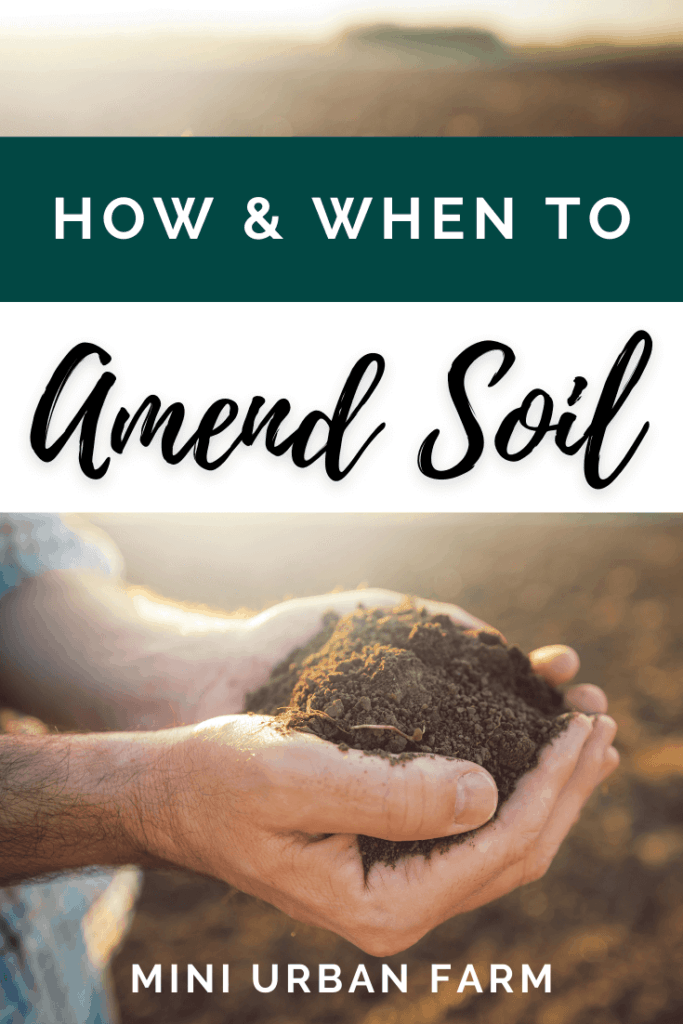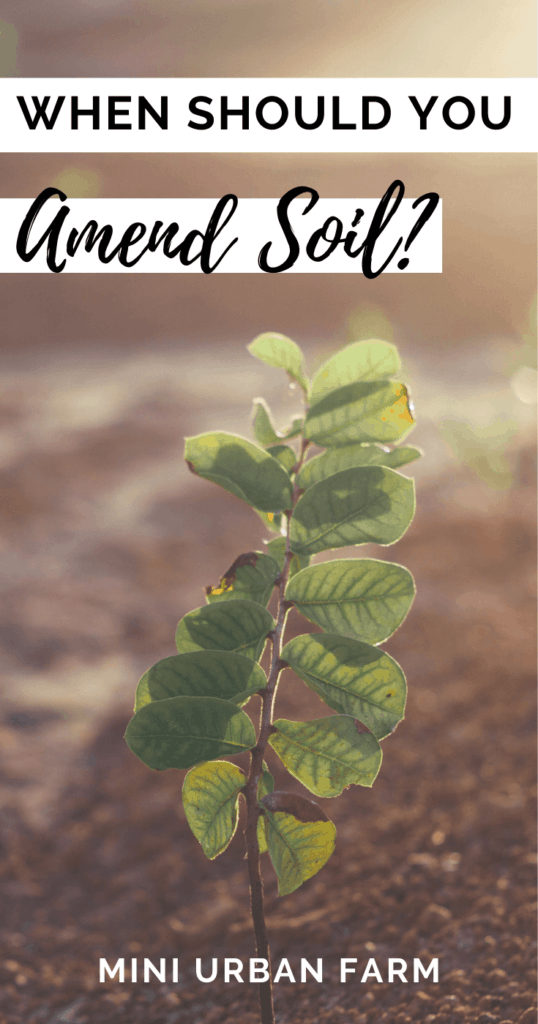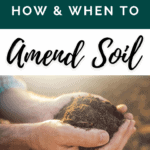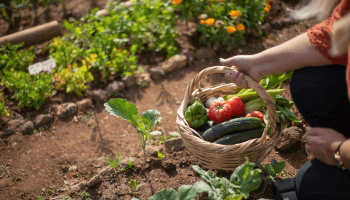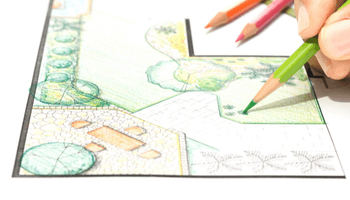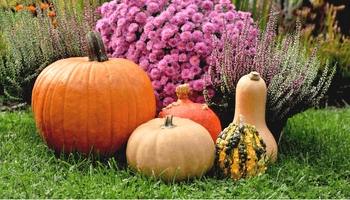Amending soil was always a topic I avoided. It just seemed so complicated and technical. But then one season I noticed that my tomato seedlings had stopped growing, my beets greens were turning purple, and my zucchini plant leaves were yellowing. At that point I realized it might be necessary to amend my soil and add in some nutrients that it lost over time. So I asked a necessary question – when should you amend soil?
Soil should be amended at the end of each growing season and if you find any nutrient deficiencies in your plants. Certain factors such as soil pH, nutrients and soil composition need to be considered before blindly amending the soil. It is important to feed the soil with the right nutrients to keep your plants happy and producing. If you are curious about when and how you should amend the soil, keep reading!
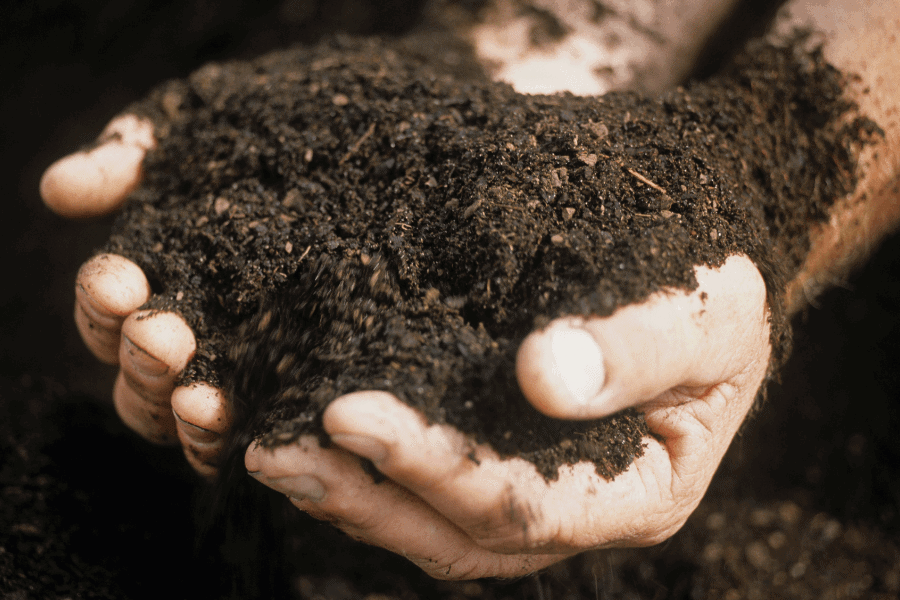
Disclosure: This post may contain affiliate links. If you purchase a product through one of our affiliate links we make a small commission from the sale at no extra cost to our readers.
Essential Nutrients for Plants
Nutrients are very important to plants or else their life cycle will be incomplete.
This could mean that they might not germinate from seeds or develop into healthy plants.
But all plants need a balance of nutrients – not too much, and not too little!
If you over-fertilize plants it can actually kill your plants. And if you under-fertilize you will see signs of the lack of nutrients such as less fruit, and yellow or purple leaves.
This is why amending your soil with the proper nutrients is actually one of the best ways to garden on a budget – it saves your plants and ultimately saves you money!
There are seventeen essential nutrients required by plants, but the most important nutrients required are nitrogen, phosphorus, and potassium. Better known in the fertilizer world as N-P-K.
These are the numbers (stay with me here) that you see on the bag of fertilizers at the garden store. A ratio of 10-10-10 means it has equal parts of all 3 – nitrogen, phosphorus, and potassium.
When amending your soil you will usually be focusing on these 3 key nutrients to maintain good soil health.
Signs that your plants need nutrients
Aside from the end of the growing season, the only other time you should be adding amendments to your soil is when you notice signs of nutrient deficiencies in your plants.
Here are a few signs to look for:
- Little or no growth of your plants – plants have become stagnant
- Leaf edges are brown, dry or dead
- Leaves have gone yellow or purple
- The leaf veins have yellow or white streaks or dots all over the leaf
If you notice any of the above signs, it’s time to look at your plant care routine and possibly amend your soil.
These signs are good indicators that your plants need something – but it might not always be fertilizer.
For example, brown leaves could also signal the lack of water. And yellow leaves could also signal overwatering.
So before adding fertilizers and amendments to your soil, look at your watering practices and any other recent changes in the growing conditions.
Once you have ruled out any other contributing factors, then it’s time to amend your soil.
Organisms which aid in Nutrient uptake
Plants take in their nutrients from their roots. Only carbon is taken in from the leaf pores of the plant. Microorganisms such as good bacteria and fungi are necessary to break down the organic compounds present in the soil into inorganic compounds.
These microorganisms help the plant to absorb vital nutrients found in the soil.
Using certain pesticides and chemicals can actually kill the microorganisms living in the soil, so be very careful about what chemicals you use around your plants!
Psst…want to fast track your garden? Get access to my FREE gardening resource library and start maximizing your garden today!
Soil Amendments
To amend your soil simply means to add in organic matter which contains the nutrients or qualities your soil needs.
There are several amendments to choose from and the ones you choose will depend on the nutrients your plants need.
- Manure: Manure adds nitrogen to the soil, but it needs to be composted until it is odourless, dark and crumbles easily. Fresh manure has a high ammonia content which can burn the plants. Cow, horse, rabbit, and chicken manure work well for the garden.
- Compost: Compost can be made at home from your kitchen scraps and other waste items, but has different levels of NPK, depending on the type of compost. Always check the NPK ratio of the type of compost you use.
- Peat Moss: Peat moss is a soil amendment to loosen heavy soil and allow roots to grow more easily.
- Bone & blood marrow: Bone & blood marrow provides plants with nitrogen and phosphorus. I have used it to amend soil when plants show signs of yellowing or stagnant growth.
- Eggshells: Eggshells provide calcium to the soil – good for combating blossom end rot on fruits.
- Fish emulsion – Fish emulsion is nigh in nitrogen and provides a quick nitrogen boost to your plants.
Before amending the soil
The most important factors that you need to take into consideration before amending the soil are:
- the longevity of the amendment in the soil
- the texture of the soil
- the pH levels of the soil amendment
This can be determined by a few simple tests to find out what kind of nutrients your soil and plants require and then you can amend the soil accordingly.
Amendment Longevity
Certain amendments are quick release – meaning they are readily available to be absorbed by your plants as soon as you put them in the ground.
These are great for a quick fix, but might need to be reapplied more often to continue feeding your plants.
Other soil fertilizers are slow-release, meaning that they only need to be applied once during a longer period of time since they continue feeding the plants on an ongoing basis.
If you buy fertilizers at the garden store, the bag will usually tell you if the amendment is a slow-release or a quick-release fertilizer.
If you want to apply amendments like manure from your own livestock, fish emulsion, or worm castings, you will need to do some research on how often that specific amendment can be reapplied.
Soil Texture
Soil texture is very important as it keeps you informed about your soil content.
If your soil has more sand content then it would feel gritty and would have large particles. If the soil is high in clay it will have small particles and would also be sticky.
These soils can make it very tricky for gardeners to garden properly.
Sand content needs to be adjusted by increasing the moisture content in the soil and also adding amendments which would help the soil to store the important nutrients. To achieve this using compost, aged manure or peat moss.
Clay soil can be improved by improving the soil permeability and absorbency.
It would also improve the aeration and drainage of the soil.
Therefore, the content to be added to the soil should be fibrous. Examples of fibrous amendments are peat moss, straw or wood chips.
PH Level Amendments
The pH level of your soil will determine how well your plants do.
Most vegetable plants will survive in soils with a pH level between 5.5 to 7.5, but certain types of vegetables need more acidic, or more alkaline, soil.
Of course, if you give each plant the optimal conditions it needs, then you will get happier plants that give you more fruit.
So instead of amending all your soil with only one amendment, test your soil to get the pH level, and then add in the needed amendment for each type of plant you are growing.
That way the area around that specific plant will be the optimal condition for growing.
How do you check the soil texture?
To check the soil texture, take a handful of soil from your garden and mould it into a ball. If the ball crumbles then it has a high sand content and if the ball can be molded and retains its shape it has a high clay content. The type of soil for planting vegetables should be a medium-density, neither too dry, nor too wet. Each plant, however, has different conditions it can survive in.
How does soil conditioner help the soil?
Soil conditioners or amendments are helpful as they can provide essential qualities or nutrients that would otherwise be lacking in the soil. You can either top-dress the soil with amendments like fertilizers, or mix in amendments like peat moss to the soil before planting to improve texture.
Is there a difference between compost and soil improver?
Compost is a type of soil improver which contains decomposed organic matter. This can add in essential nutrients to the soil and also helps dry soils retain moisture. Soil improvers or amendments in general add in qualities or nutrients to the soil that are lacking in existing soils. These can be essential to providing your plants with nutrients that the would otherwise not be receiving.
Amending your soil is an important part of keeping you plants happy and should be done after each growing season. You should also add in any necessary amendments if you notice signs of nutrient deficiencies such as yellowing, dying, or stagnant growth. If your plants are already thriving in the current soil then there is no need to amend the soil, as over-fertilizing can actually have negative effects on your plants!
I hope this was super helpful! And for more gardening resources, get access to our free gardening resource library! It will help you fast track your garden and it only takes 5 seconds!
Pin When Should You Amend Soil!
